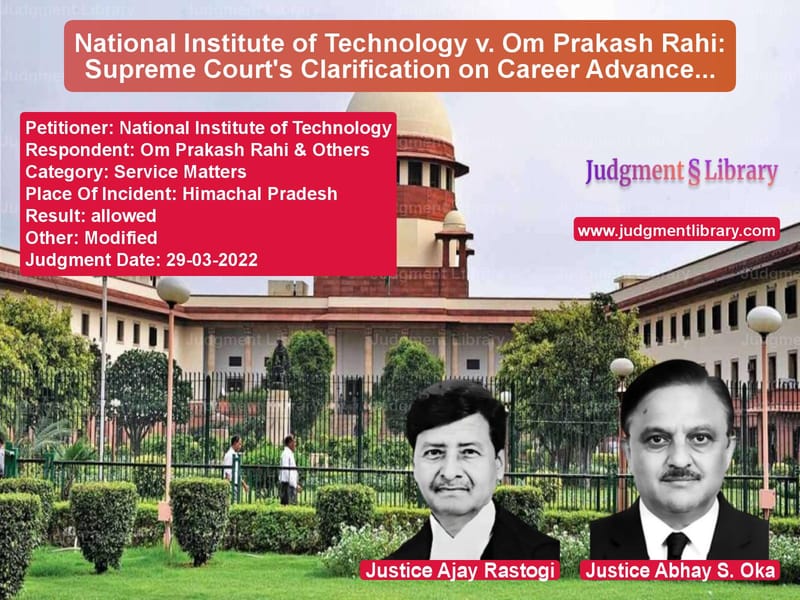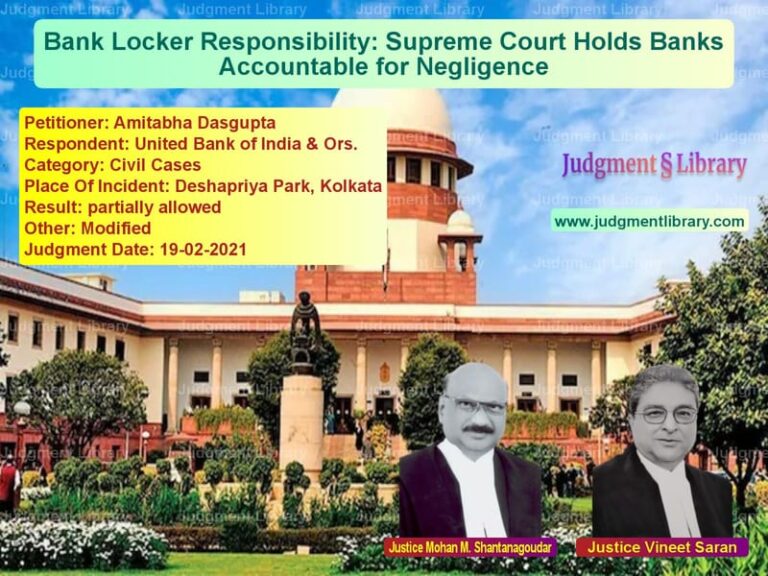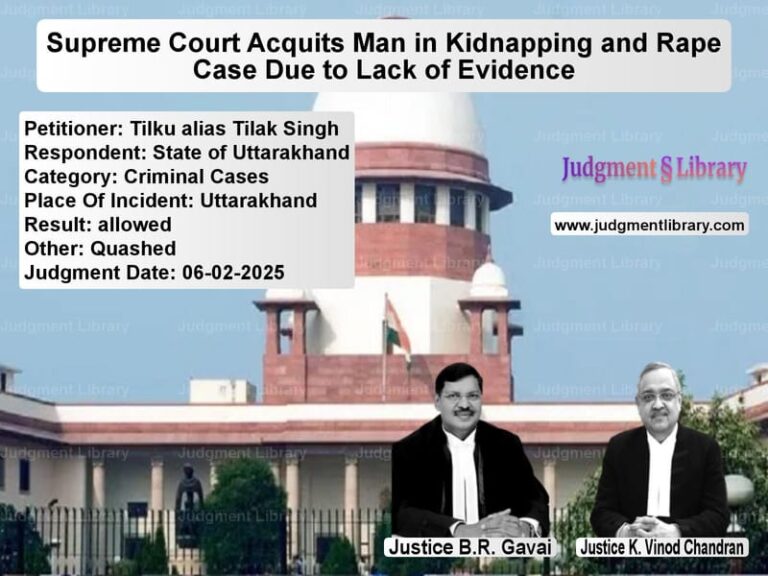National Institute of Technology v. Om Prakash Rahi: Supreme Court’s Clarification on Career Advancement Scheme and Faculty Promotions
The case of National Institute of Technology v. Om Prakash Rahi is a crucial decision regarding faculty promotions under the Career Advancement Scheme (CAS) and the jurisdictional authority for granting promotions and financial benefits at the National Institute of Technology (NIT). This judgment primarily focused on the legality of the promotions granted to faculty members based on their length of service and whether those promotions were in accordance with the prescribed guidelines of the Ministry of Human Resource Development (MHRD).
Background of the Case
The respondent, Om Prakash Rahi, and other teachers were initially appointed as Lecturers in various engineering departments at the Regional Engineering College (REC), Hamirpur (now the National Institute of Technology, Hamirpur). After their appointment, they were later promoted based on the guidelines prescribed by the MHRD, and their pay was upgraded as per the recommendations of the 6th Central Pay Commission (CPC). However, a dispute arose regarding their further promotion to the post of Associate Professor with a higher pay scale of Rs. 37400–67000 and the AGP of Rs. 9000 after completing three years of service in the AGP of Rs. 8000.
Following the recommendations of the selection committee, the Director of NIT Hamirpur granted the promotion and re-designation of the respondents without completing the necessary selection process, which led to the grievance and filing of a writ petition by the respondents in the Himachal Pradesh High Court. The High Court upheld the promotion decision, leading to this appeal before the Supreme Court.
Legal Issues Considered
- Whether the Director of NIT Hamirpur had the authority to grant promotions and re-designations without approval from the Board of Governors (BoG) and MHRD.
- The applicability of MHRD guidelines issued in 2008 for promotions and re-designations of faculty members in NITs.
- The legal status of promotions under the Career Advancement Scheme (CAS) in NITs post the enactment of the National Institute of Technology Act, 2007.
- The scope and application of the MHRD’s directives and the 6th Central Pay Commission’s recommendations in the context of NIT faculty promotions.
Petitioner’s Arguments (National Institute of Technology)
- The petitioner argued that the guidelines issued by the MHRD in 2008 were not applicable to NIT faculty members after the National Institute of Technology Act, 2007 came into effect.
- The promotion and re-designation of the respondent teachers as Associate Professors were made without following the correct procedure outlined in the statute, including the non-formation of a Selection Committee.
- The Director did not have the authority to grant such promotions independently, as the approval of the Board of Governors was necessary.
- It was submitted that the promotion scheme for faculty members had to follow the formal procedure under the new statute and the guidelines laid down by MHRD in 2012.
Respondent’s Arguments (Om Prakash Rahi and Others)
- The respondents argued that they had completed the requisite three years of service in the AGP of Rs. 8000 and were therefore entitled to the promotion and re-designation as Associate Professors under the applicable guidelines.
- The selection process conducted in 2013 was in compliance with the norms outlined by the Ministry of Human Resource Development (MHRD), and the approval of the Selection Committee and the Board of Governors was duly obtained.
- It was contended that the MHRD guidelines dated 14th March 2012 and 18th March 2013 applied to them, and their promotion was in line with the Career Advancement Scheme (CAS) stipulated by the Ministry.
- The respondents further argued that the Director’s actions were justified under the then-existing rules and that the Board of Governors’ approval was a formality post-promotion.
Supreme Court’s Judgment
The bench, comprising Justices Ajay Rastogi and Abhay S. Oka, ruled in favor of the respondents, but with certain clarifications.
1. Authority of the Director of NIT Hamirpur
“The Director, though a key administrative officer, did not possess the requisite authority to unilaterally grant promotions without the approval of the Board of Governors as required by the NIT Act and the guidelines laid out by the Ministry of HRD.”
The Court emphasized that the Director’s actions were not in accordance with the statutory procedures and, therefore, the promotions granted by the Director without proper authority could not be upheld. The Court clarified that the Board of Governors must approve such decisions as part of the established process.
2. Applicability of MHRD Guidelines
“The guidelines issued by the Ministry of Human Resource Development dated 14th March 2012 and 18th March 2013 are applicable to the National Institutes of Technology (NITs) and must be followed for the promotion of faculty members.”
The Court held that the MHRD guidelines were applicable to the respondent teachers and provided clear criteria for their promotion. The Court pointed out that the respondents were entitled to the benefits stipulated under the guidelines for completion of the required service period and academic performance.
3. The Role of the Selection Committee
“The failure to constitute a Selection Committee and obtain approval from the Board of Governors for the promotion process led to a violation of statutory procedure.”
The Court held that the promotion process for the respondent teachers should have followed the formal selection process involving the Board of Governors’ approval. It emphasized that the guidelines cannot bypass statutory norms and the authority of the Selection Committee.
4. The Statutory Framework under the NIT Act, 2007
“The provisions under the National Institute of Technology Act, 2007, and the subsequent amendment in 2017 clearly laid down the criteria and process for promotions within NITs, making it clear that all appointments must go through a formal process of selection.”
The Court pointed out that the NIT Act, 2007, and subsequent amendments had redefined the process for appointments and promotions within NITs. The petitioners failed to adhere to these provisions, which led to the impugned decision being incorrect in terms of procedural compliance.
5. Modification of the High Court’s Decision
“While the High Court’s ruling was partially correct in upholding the promotion, it erred in its application of the MHRD guidelines, and the Court intervened to clarify the correct procedure to be followed for further promotion to the post of Professor.”
The Supreme Court allowed the appeals and set aside the High Court’s decision to the extent it upheld the unilateral promotion by the Director. However, the respondents were allowed to continue in their current roles while the process for promotion to the post of Professor was initiated in compliance with the statutory guidelines.
Key Takeaways from the Judgment
- The Court made it clear that promotions under the Career Advancement Scheme (CAS) must follow a formal selection process involving the Board of Governors’ approval.
- The judgment reinforces the need for statutory compliance with the National Institute of Technology Act, 2007, especially regarding promotions and faculty appointments.
- It clarified that the MHRD guidelines for faculty promotions apply to NITs and must be strictly followed to ensure fairness and merit-based advancement.
- The ruling ensures that any faculty member seeking a promotion must undergo a formal selection process, with clear recommendations from the Selection Committee and approval from the Board of Governors.
Implications of the Verdict
This ruling is significant for several reasons, particularly in the realm of faculty promotions and administrative authority within NITs:
- It establishes a precedent for the proper process of promotion and the importance of adhering to statutory guidelines when advancing faculty members.
- The judgment protects the rights of teachers to receive promotions and financial benefits, provided they follow the correct procedures.
- The decision has wide implications for administrative bodies in educational institutions, mandating strict compliance with established recruitment and promotion procedures.
Overall, this judgment strengthens the governance framework within NITs and other educational institutions, ensuring that faculty promotions and appointments are conducted transparently and fairly, following established guidelines and legal provisions.
Petitioner Name: National Institute of Technology.Respondent Name: Om Prakash Rahi & Others.Judgment By: Justice Ajay Rastogi, Justice Abhay S. Oka.Place Of Incident: Himachal Pradesh.Judgment Date: 29-03-2022.
Don’t miss out on the full details! Download the complete judgment in PDF format below and gain valuable insights instantly!
Download Judgment: national-institute-o-vs-om-prakash-rahi-&-ot-supreme-court-of-india-judgment-dated-29-03-2022.pdf
Directly Download Judgment: Directly download this Judgment
See all petitions in Employment Disputes
See all petitions in Promotion Cases
See all petitions in Workplace Harassment
See all petitions in Public Sector Employees
See all petitions in Recruitment Policies
See all petitions in Judgment by Ajay Rastogi
See all petitions in Judgment by Abhay S. Oka
See all petitions in allowed
See all petitions in Modified
See all petitions in supreme court of India judgments March 2022
See all petitions in 2022 judgments
See all posts in Service Matters Category
See all allowed petitions in Service Matters Category
See all Dismissed petitions in Service Matters Category
See all partially allowed petitions in Service Matters Category







